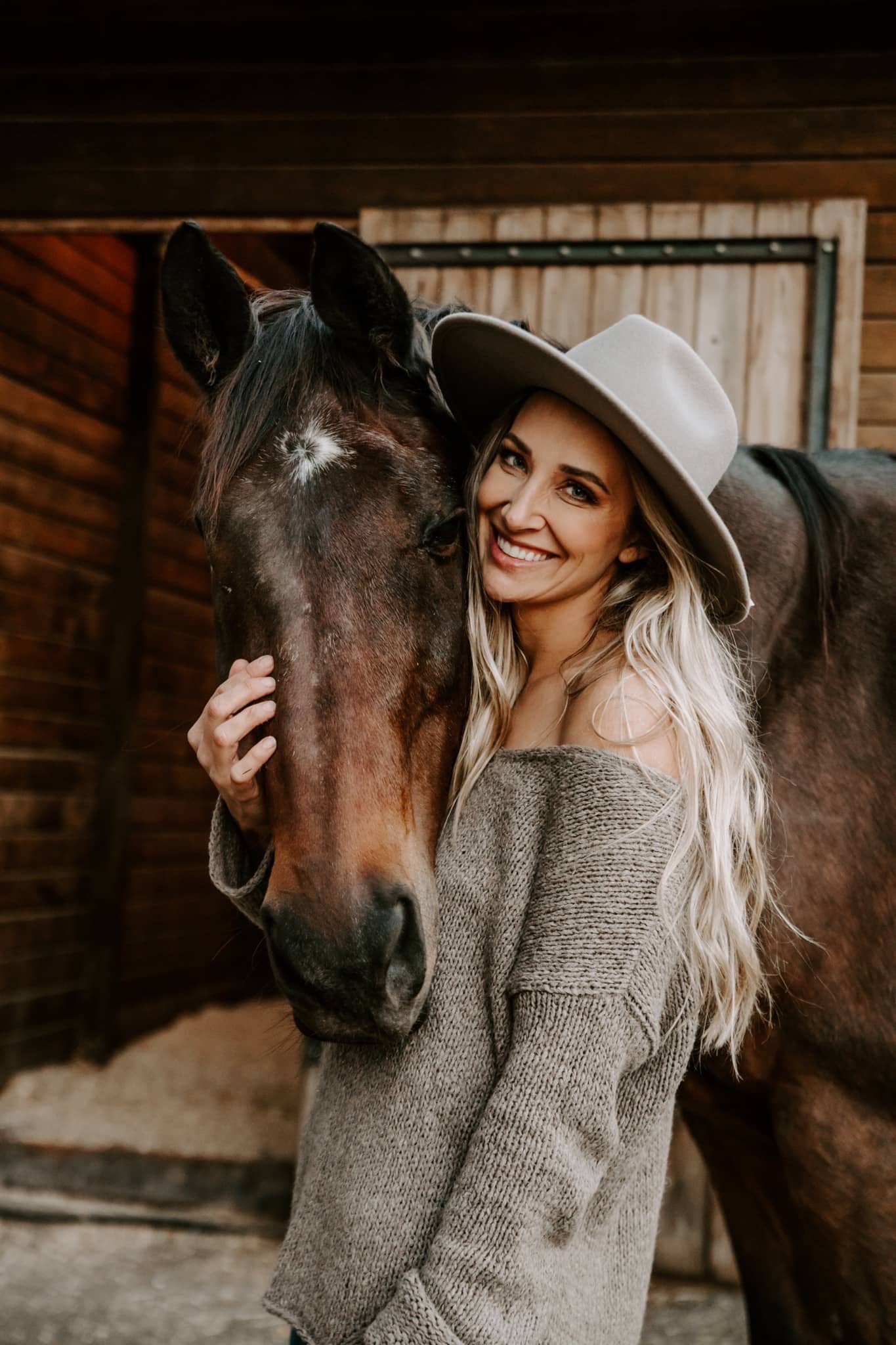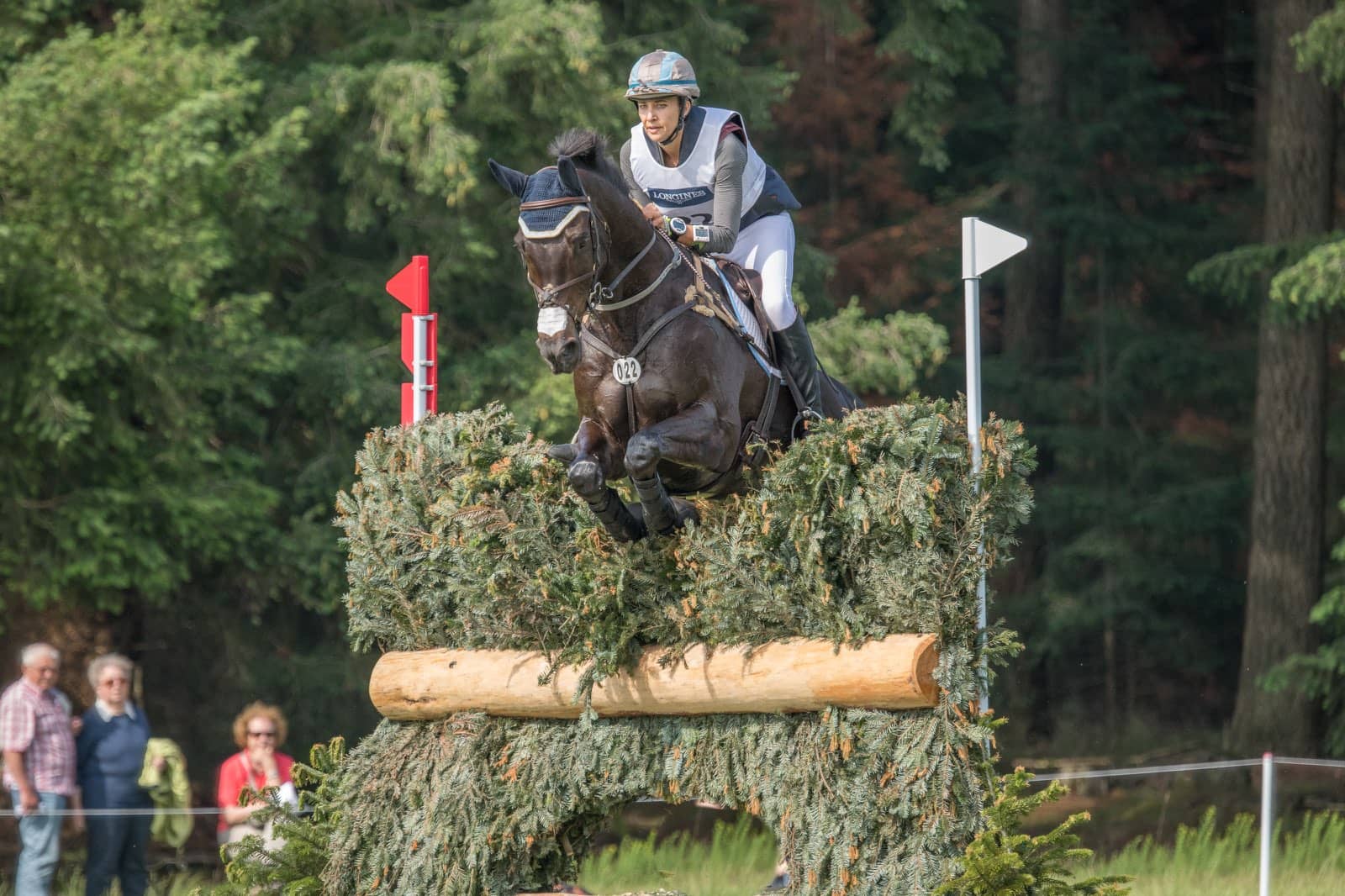Q&A: Frankie Thieriot Stutes
Eventing champion Frankie Thieriot Stutes on riding to the top, the Olympic Games, and staying committed to her happiness in a risky sport.


Please introduce yourself.
Frankie Thieriot Stutes. Horses: Chatwin & Chicago. Discipline: eventing. Professional.
What was your earliest encounter with horses?
When I was one, my cousin put me on her horse. And then when I was four, I was really wild as a kid, so my mom put me in pony lessons to do something with my energy.
What has been the most unexpected challenge in your training?
Figuring out, through different courses of life, what horses have meant in that moment, whether to continue or not, or how intense it should be. It's not that there's one unique challenge, but rather from a mental aspect, what horses meant and how to look at riding in those moments.
Especially training with the U.S. team, things got really intense, so a big challenge was making sure it was always something that was fun. Unlike a lot of people who ride at that level, you usually have many, many horses, and a groom—and I've always had just one big horse at a time and done all the care for my horse myself. I do this because I believe the partnership with my horse is so important.
Also, I don't do this as my full-time job. Eventing takes up all of my time, but is not paying my bills. Finding what the purpose of it is in my life, and making sure, is it doing that? is so important. You have to figure out what you ride for, and for me, I do it to have time to decompress. After I won the National Championship in 2018 and I was on the squad, everything became so much more intense, and I put so much more pressure on myself. The training was intense, and the travel was intense. I started to lose my appreciation for it, but ironically I wasn't doing as well, so I went back to the drawing board to remember what I do this for, as my first priority, and let the rest fall into place, and it did.
Was there ever a time that you considered leaving the sport?
Yeah, a lot of different times, honestly. In college, I was going to get rid of my horse, but then he got hurt so I had to rehab him. After college, I had a corporate job and quit riding for 6-8 months, and then a friend of mine needed her horse ridden for a few months, so I agreed to take on the horse but ended up competing and campaigning that horse for six years.
Even right now, I'm looking at if I want to campaign my new horse or not and scale back for a bit. I think when you have a whole squad of horses, it's harder to consider not doing it, but I own a marketing company full time. So for me, riding is not the basis of my income or life in that regard. It's worth it at this top level for me to try to go to the Olympic Games, but you have to constantly re-evaluate it when you have little kids.
Are you a planner or an improviser? In what ways...
I think both. With horses, you always have to improvise. You have to plan your general schedule, and when you're at the top level of the sport you have to figure out which competitions you're going to do, which ones you're going to give them time off from, especially in eventing where it's very grueling for them long-term.
What has been the greatest act of kindness you've received from another rider?
My two best friends flew to Germany last year (2019) to be with me for my first 5*. They flew on their own dime to be there to coach me and help me. The whole experience of that was so much more incredible, because it was also with them. This sport takes a village and it is because of that village that it is not only possible, but wonderful. They put their businesses on hold for 10 days to make sure they were there for me, so that was very special.
What is your horse's favorite treat?
Glazed Donuts!! (Chatwin)
What do you think is the most important (or underrated) riding exercise? What is your favorite exercise? And what exercise is most difficult?
Most important: establishing key fundamentals. Always going back to the basics is one of the most important things.
Favorite: I don't necessarily have one. For me, it's so much cross training. I think cavaletti work is really important, and switching things up so the horses can have a break mentally.
Most difficult: It just depends completely on the horse. For example, my new mare finds certain things challenging, while my longtime competition horse doesn't find anything challenging anymore. Pole work and seeing distance can be quite hard, even cavalettis on the turn, nine feet apart, and cantering those, is hard no matter what.
What has been one of your most humbling moments with horses?
I have a rule with myself that you're allowed to be excited about a big win as much as you're allowed to get mad at yourself for it not going well. I've been really fortunate the last several years to get to win quite a bit, but there was a time before Kentucky last year when we thought my horse got hurt in a catastrophic way, and I didn't get to go, which was really devastating. I had to mentally reset, so I went to Luhmühlen and became the highest placed American to compete abroad in the last five years. So for me, I had hit rock bottom, but was back at the top a few months later.
Horses have a way of making you feel cautious when it's going well. It's funny, nobody seems to remember these moments as much, and internally how much you can beat yourself up but also learning ways to improve. Even the people on my squad who have been to five Olympic Games are still learning. And I firmly believe it puts you where you're meant to be. I wasn't meant to be in Kentucky, and I don't know why, but I was meant to take my horse to Germany and do my first 5* there, and being there in that moment was pretty spectacular.

In what ways do you believe riding horses has informed your personal life and behavior?
My whole business (Athletux) is centered around helping equestrians and consulting for different federations and equine brands. On an emotional level, horses are like my therapists and they've shaped me as the person I am, in terms of how I operate on a daily basis.
Do you have any superstitions around shows?
Yeah, I have so many weird things. I do everything in a systematic routine. I work with an energy lady a lot, just to try to focus. At the top level, you have to have a routine to be mentally where you need to be in order to compete at your best. For me, at the very big shows, I'll sit and meditate or calm down for 10 minutes. Then, I always tack up my own horse, and I have a way I do that. I have a lot of the same stuff I've used forever, like tack or saddle pads. If I win, I'll use that saddle pad again, and if I don't, I won't. For breeches, I have a few pairs of show breeches I always wear, but if I fall off, I won't wear them the next time.
What is the most courageous thing you've done—on or off a horse?
Acts of courage are measured differently by different people. To me, one of the most courageous things a person can do is to pursue what makes their heart sing regardless of whether or not their journey looks like everyone else’s. I think it is incredibly courageous to look within and make decisions based on not how other people will measure you, but how you can be the best version of yourself.
To compete at the top level with two little kids is hard. A couple years ago I was at a horse show with my son, and another girl had a six-month-old baby, and she died on course, and I still had to ride. You have to decide within yourself, am I ok doing this? What does this mean as a mom? I think if you love something enough, whether it's dangerous or risky, you should still go for it. That was a turning point for me, watching another mom leave behind her baby. I remember thinking at the time that I want my boys to know they can always take risks and chances if it means they're happy. Things are going to happen, and you cannot control some of those things, but I want to be courageous in leading by example for my kids and beyond.
What inspires you to continue to learn within the sport?
I always feel like I need to get so much better. Some people mentally come out of a dressage test and think, oh, that was great or the judge didn't give me the score I needed. But even if I get a 76%, I want to know how it can be better the next time. That's what drives me, my own expectation. There's an ability to win in this country, or to win against the best people in the world, and I think the world is way ahead of our country. And I think, is this good enough against the best in the world? One of my coaches a few years ago, Yves Sauvignon, said to me "The funny thing about you, I've always noticed, is you don't even really love winning that much, you just hate losing," and it's so true!
When you're not riding, you can be found doing...?
Working and being a mom.
Is there a movement, organization, or cause that you are involved with? And how can other people get involved?
Yes, my bag company Frankie Cameron raises money for Project Night Night. I give a portion of all the sales each year to them. It's a really neat nonprofit that helps displaced, underprivileged kids receive childhood essentials so they have a predictable source of security.
Lastly, in one or few words, what does horse riding mean to you?
Riding for me is my time to decompress. It's so much more than just about competing, but my time to just be with my horse and take a deep breath. I would call Fric Frac, my old horse, my calm in the day. During my worst moments, he's where I go when I can't pull myself together.